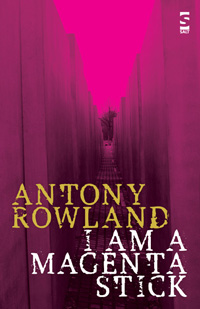reviewed by Judi Sutherland
Prize-winning Rowland plays around with language (except that this guy doesn't play around).
Antony Rowland’s poetry sits somewhere between the mainstream and the avant-garde. Throughout his collection I am A Magenta Stick, he twists and teases language into unusual forms and images; at first glance it might seem baffling, but it is not quite as strange as it initially appears; for example, the title poem refers to the way Rowland is depicted in his child’s drawing.
Picks up a well-known genre of writing and runs with it, into the bizarre.
Rowland piles up the language like layers of paint, adding texture to his pictures. It’s often ungrammatical but it is rich and sensual. There’s an element of stream-of-consciousness writing as impressions tumble on to the page, but Rowland’s quirky style demands some concentration. There are moments when it truncates into staccato noun-piles like those beloved of headline writers: "Floored in tile bar, you break my parch / and then dry my ears too wet for truth". He seems to be capturing an internal dialogue with all its accretion of associations and personal subtext. It is distinctive, and different. The result seems like cryptic crossword clues at first reading, and the reader begins to feel smug each time a line is solved, but the heady jumble of peculiar language does eventually settle in the brain and makes some kind of joyful sense.
One of Rowland’s trademarks is his choice of unusual verbs, which reminded me of Daljit Nagra’s translations from the Punjabi in Look We Have Coming To Dover! (Faber, 2007). Like Nagra, Rowland makes the familiar strange. In ‘The Yellow Villa’ he tells us: "The plane morses the tree-lined dark". In ‘Quays’, a paean to Salford, where he now teaches, he asserts:
Unknown slick grunges the plaster. The aptness of bees knees shovellor ducks graces the lock.
Rowland explores ostranenie in a number of ways. He writes about places where he has lived, such as Yorkshire and Manchester, and places he has travelled to, including New York and some unspecified parts of Eastern Europe. In each poem he provides a vibrant travelogue of images and feelings. In ‘This Is Pleasure’ Rowland evokes New York in typical style, by observing the wording of notices:
Lovely to meal you among the sneeze squeeze and toot of this city, the PLEASE SLOW DOWN
Three consecutive poems chart the horror of the foreign budget hotel. In ‘The Unexpected Guest’, ‘Would a Smile Kill’, and ‘The Mind Resort’, guests grumble, Trip-Advisor style, about the surreal inadequacy of their accommodation. The second of these poems concludes:
Twice we were charged the price of living and disadvantages were the FBI, swat teams, large guns, remote-controlled eyes, but the English soaps made up for everything.
Rowland picks up a well-known genre of writing and runs with it, into the bizarre.
Rowland is also a foodie and his poems about ‘Gravy’, ‘Beer’, and the ‘Bedfordshire Clanger’ are sensual hymns of praise to ordinary fare that becomes exotic. ‘Gravy’ is a lyrical praise poem, informed by ancient cookbooks and molecular gastronomy:
No, schyl Oysters and seeth them in wyne and in hare own broth, cole the broth through a cloth and alye it with floer of Rys or cheat with chicken with rosemary sprigs roasted then sieved to osmazome pap.
In another strand of the collection, Rowland highlights the speech of people who are using English as a foreign language, resulting in some unintentionally exotic syntax. ‘Engrish’ mashes together some garbled words like a manic phrasebook: "Sadly we are shut. Sorry, the unconvinced / and hope you’ll still support us. Thank you very much." Rowland enjoys the quixotic effects of foreign influences on English, and accepts them as inspiration for his own wordcraft.
Throughout the collection, Rowland demands that we take nothing for granted and ensures that we visualise the world as the extraordinary place that he perceives it to be. It is this unique vision that brings a fresh vibrancy to Rowland’s work and explains why this consistently self-assured writer was recently awarded the Manchester Poetry Prize.










